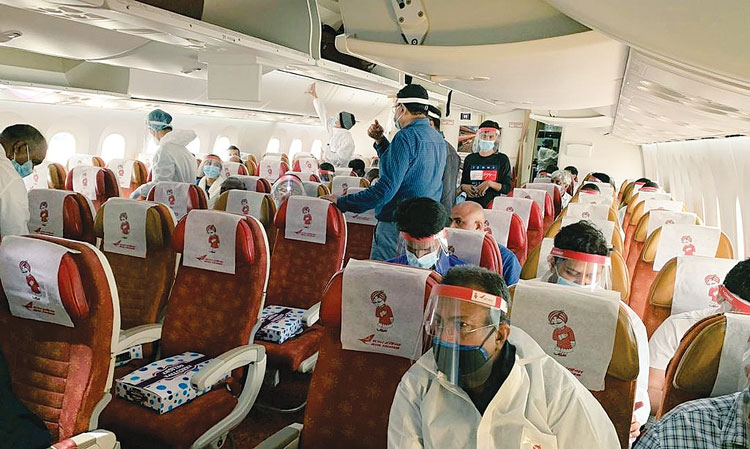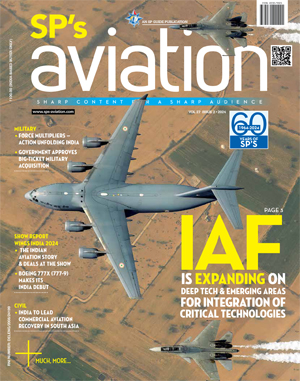INDIAN ARMED FORCES CHIEFS ON
OUR RELENTLESS AND FOCUSED PUBLISHING EFFORTS

SP Guide Publications puts forth a well compiled articulation of issues, pursuits and accomplishments of the Indian Army, over the years

I am confident that SP Guide Publications would continue to inform, inspire and influence.

My compliments to SP Guide Publications for informative and credible reportage on contemporary aerospace issues over the past six decades.
Air Travel – Proceed with Caution
While there is an urgent need for restoring normalcy in air travel, given the serious hazards associated with COVID-19, the MoCA has no option but to move forward with extreme caution

In the beginning of this year, the outbreak in India as also across the globe, of Coronavirus or COVID-19 Pandemic, has had a devastating impact on the Indian economy. On account of the non availability of preventive and curative medicines for this disease as it was a virus new to the world, the spread of the epidemic throughout India and across the world, has been uncontrolled and rapid. This left no option for the Indian Government other than to impose a total lockdown that was implemented with effect from March 23, 2020 bringing economic activity to a grinding halt. One of the segments of the Indian industry that contributes significantly to the national economy, is the Indian civil aviation industry in which the Indian airline industry has a major role to play. Unfortunately, this segment of the industry has been so badly affected by the lockdown that the sustainability and in fact the very survival of Indian carriers has been severely jeopardised.
Normal operations by the Indian domestic carriers to the various cities within the country as well as to airports outside India, had to be shut down completely. The impact of the lockdown was severe as the Indian airline industry depends on regular flights for generation of revenue. Only special flights under Vande Bharat Mission, a programme financed by the Government, were directed to operate. Flights under this scheme were operated by Air India and by private airlines. Beginning on May 6, 2020, the Indian carriers were authorised to operate to selected destinations abroad with the explicit purpose of flying back to India, citizens of the nation that were stranded outside the country. Between May 6 and October 24, 2020, the Indian carriers facilitated the repatriation of over 20 lakh Indian citizens stranded abroad.
With the passage of time, the nation has progressively adapted to the “New Normal” under which one is required to adhere to the laid down guidelines for social distancing, wearing of face mask and other restrictions imposed by the Government to prevent transmission from person-to-person of infection by Coronavirus. With a new set of guidelines laid down by the Government, the airlines in India have been permitted to operate flights, initially in the domestic sector followed later in the international segment. Two months after the total lockdown was imposed, the Ministry of Civil Aviation (MoCA) gave the first green light to Indian carriers to commence passenger services from May 25, 2020 only in the domestic segment, albeit with some restrictions imposed by the Government. On account of the compelling need to maintain social distancing, airlines were directed to operate flights with the centre seat vacant on both sides of the aisle. This restricted the number of passengers on each flight that airlines could carry. However, with severely curtailed tourism within the country and other COVID-19 related restrictions imposed on the society, the demand for air travel was very low.
Initially, the total number of flights that the Indian carriers were authorised to operate was restricted to 33 per cent of their pre-COVID level. No international operations other than Vande Bharat flights, were permitted. The level of operations in respect of domestic flights was enhanced on June 26, 2020 from 33 per cent to a maximum of 45 per cent of their pre-COVID-19 domestic flights. On September 2, 2020, the MoCA issued instructions revising the limit to 60 per cent. With the anticipated increase in the demand for domestic air travel during the festival season, the MoCA has been considering raising the authorisation level of domestic operations to 75 per cent.
As for international flights, countries are generally apprehensive about Coronavirus spreading through international flights unless suitable precautions are adopted strictly. Under a scheme dubbed as “International Air Bubble Flights”, some countries have agreed to open their borders for each other for international flights. This step has been taken by countries to break the deadlock in international travel and is based on trust on each other’s capability to control the spread of the Coronavirus. India has entered into an agreement under the Air Bubble Flights scheme with 18 countries that include the United States, France, Germany, Japan, Kuwait, the Maldives, the United Arab Emirates and others. Under these, airlines from each of the countries are allowed to operate a specific number of flights to India every week. Similarly, Indian carriers have the right to operate to cities in these 18 countries. The guidelines for travel under International Air Bubble are very similar to those promulgated by the MoCA for the flights under Vande Bharat Mission. On October 27, 2020, the Directorate General of Civil Aviation (DGCA) extended the suspension of other international commercial flights excluding all-cargo flights, till November 30, 2020. There has however, been a surge in COVID-19 cases in Europe on account of which France and Germany have already announced a total lockdown for a month.
While there is a crying need for restoring normalcy in air travel in both the domestic and international sectors, given the serious hazards associated with COVID-19, the MoCA has no option but to move forward with extreme caution.





